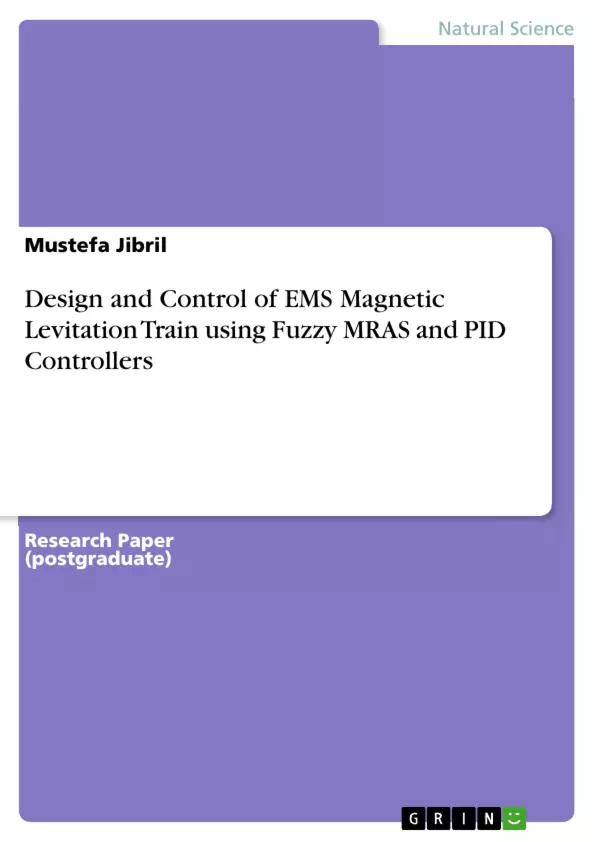In this paper, a Magnetic Levitation (MAGLEV) train is designed with a first degree of freedom electromagnet based
totally system that permits to levitate vertically up and down.
Fuzzy logic, PID and MRAS controllers are used to improve the Magnetic Levitation train passenger comfort and road handling. A Matlab Simulink model is used to compare the performance of the three controllers using step input signals. The stability of the Magnetic Levitation train is analyzed using root locus technique. Controller output response for different time period and change of air gap with different time period is analyzed for the three controllers.
Finally, the comparative simulation and experimental results demonstrate the effectiveness of the presented fuzzy logic controller.
Inhaltsverzeichnis (Table of Contents)
- Introduction
- Mathematical Models
- Maglev train system mathematical model
- The Proposed Controller Design
- Outward approach
- Inward approach
- Stability of maglev train system
- Fuzzy Controller
- Input and Output of fuzzy controller
- MRAS (Modified MIT Rule)
- PID
- PID Tuning
- Result and Discussion
- Magnetic force versus current graph
- Maglev train system simulation response
- Comparison of the Proposed Controllers
- Numerical values of the Performance of PID, MRAS and Fuzzy Controllers
- Conclusion
Zielsetzung und Themenschwerpunkte (Objectives and Key Themes)
This research aims to develop methods of improving efficiency in transportation using Magnetic Levitation (MAGLEV) technology. The study focuses on designing and controlling a MAGLEV train system with a first degree of freedom electromagnet-based system. The paper explores the use of various control systems, including fuzzy logic, PID, and MRAS controllers, to enhance passenger comfort and road handling of the MAGLEV train. The research evaluates the performance of these controllers through simulation using Matlab Simulink, analyzing their stability and response characteristics.
- Design and control of a MAGLEV train system using electromagnetism.
- Comparison of the performance of fuzzy logic, PID, and MRAS controllers for MAGLEV train control.
- Analysis of the stability and response characteristics of the controllers.
- Simulation and experimental evaluation of the proposed controllers.
- Improvement of passenger comfort and road handling in MAGLEV train systems.
Zusammenfassung der Kapitel (Chapter Summaries)
The paper begins by introducing the concept of magnetic levitation and its application in MAGLEV trains. It then delves into the mathematical models used to represent the MAGLEV train system, focusing on the electromagnetic forces involved and the relationship between voltage, current, and displacement. The research then explores different approaches to control system design, highlighting the outward and inward approaches. Stability analysis of the MAGLEV train system is also addressed, followed by a detailed explanation of the fuzzy logic, MRAS, and PID controllers.
The paper then presents simulation results, showcasing the magnetic force versus current graph and comparing the performance of the three controllers in terms of their response to a step input, stability, and ability to handle changes in air gap. The authors discuss the numerical values of the performance parameters of each controller and conclude with a comparative analysis of their effectiveness.
Schlüsselwörter (Keywords)
The primary focus of this research lies in the design and control of Magnetic Levitation (MAGLEV) trains. The paper explores the application of fuzzy logic, PID, and MRAS controllers to improve passenger comfort and road handling. The study utilizes Matlab Simulink for simulation and analysis, focusing on the stability and response characteristics of the controllers. Key concepts explored include electromagnetic forces, transfer functions, and the application of control systems to enhance the performance of MAGLEV train systems.
- Arbeit zitieren
- Mustefa Jibril (Autor:in), 2020, Design and Control of EMS Magnetic Levitation Train using Fuzzy MRAS and PID Controllers, München, GRIN Verlag, https://www.grin.com/document/541837




